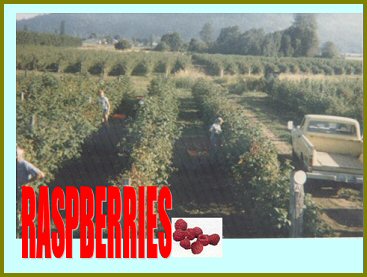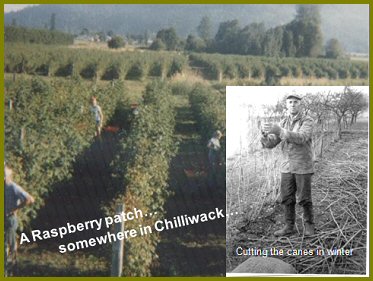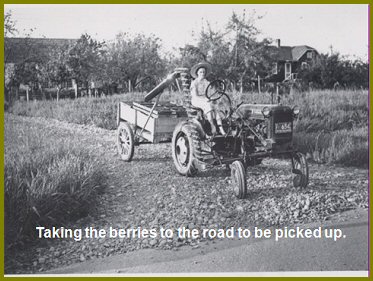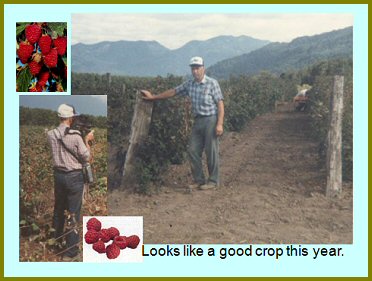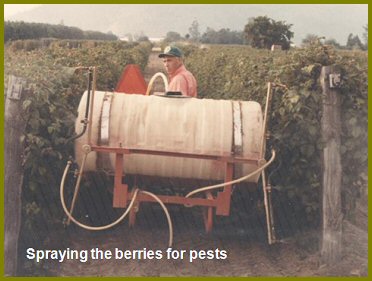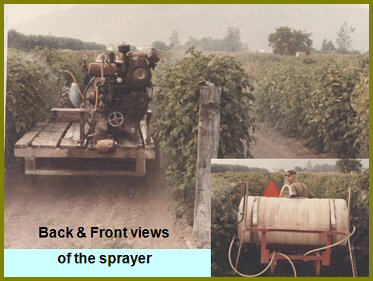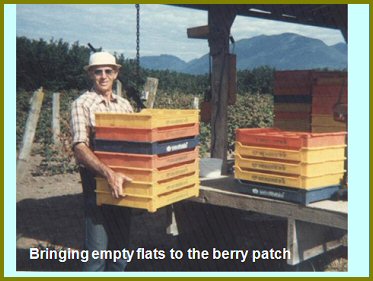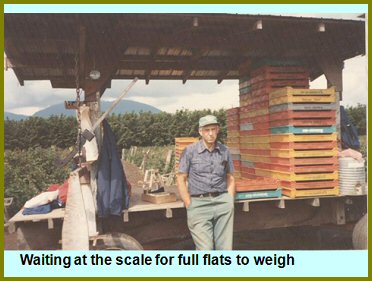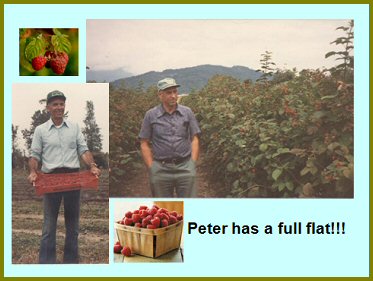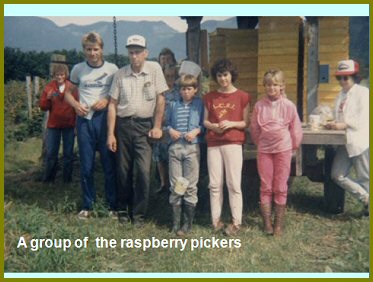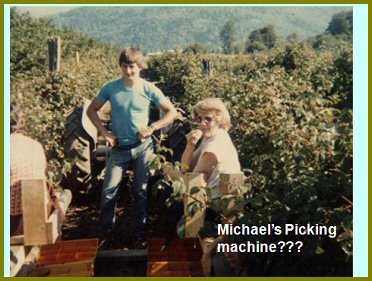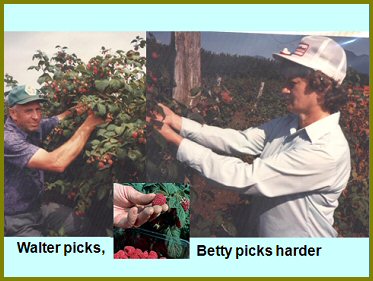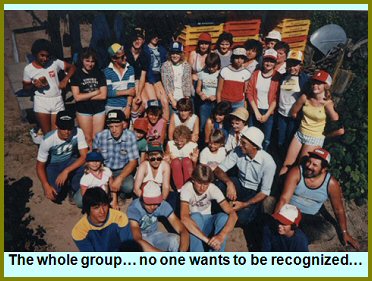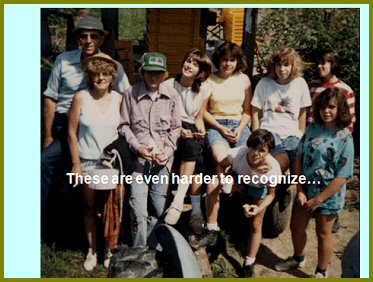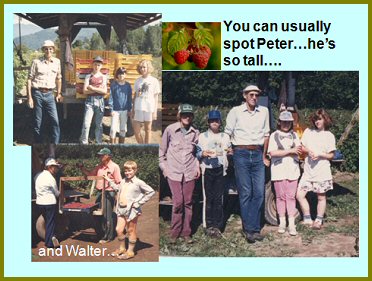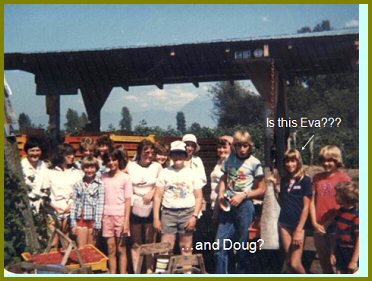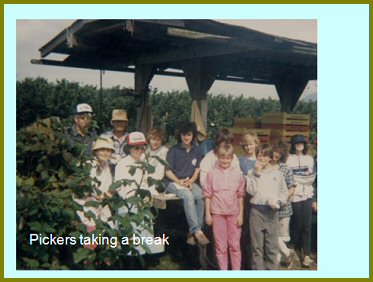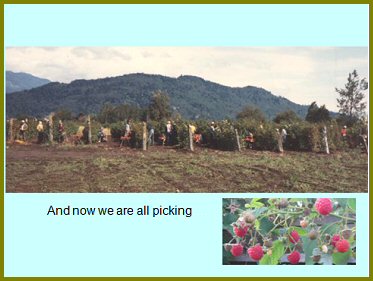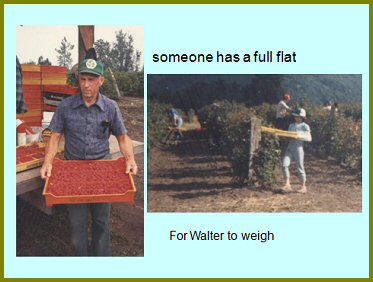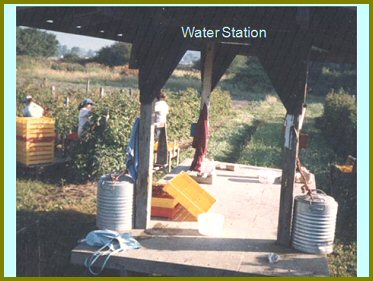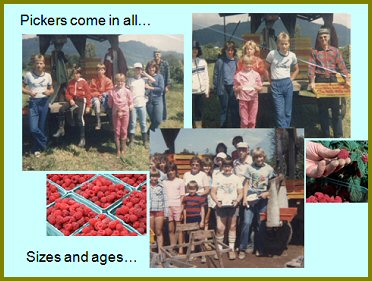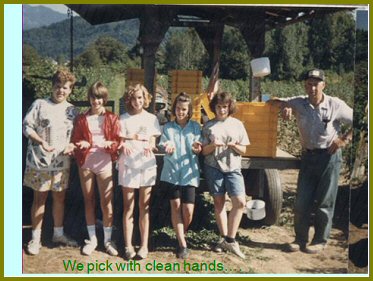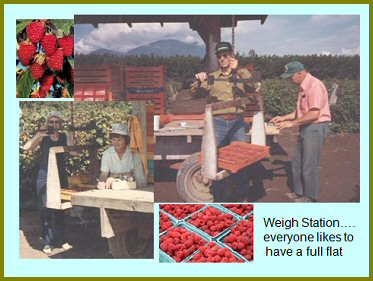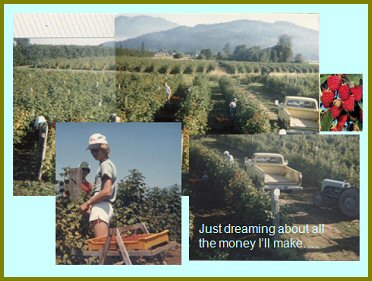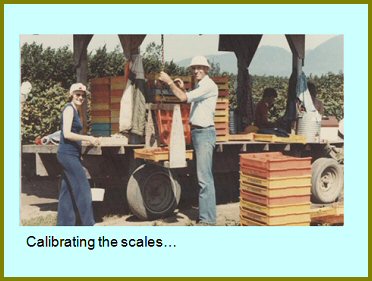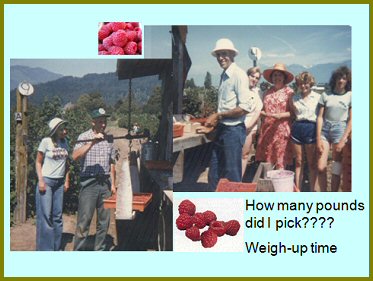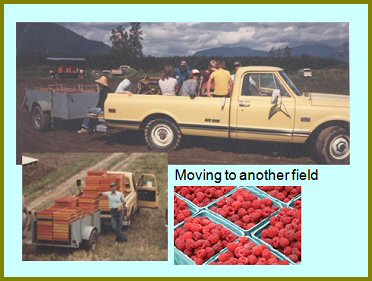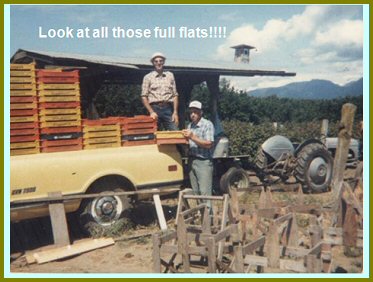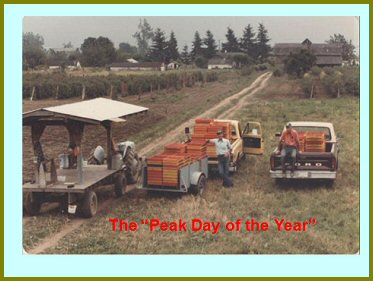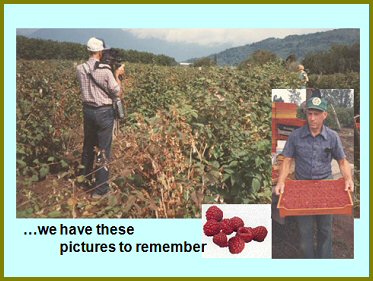|
Yarrow, British Columbia
Edited by
Esther Epp Harder, Edwin Lenzmann, and Elmer Wiens
Yarrow's Raspberry Industry
Bumper Crop 1947 | Cascade Foods Ltd.
| Community Portrait - Jacob C. Krause
Pacific Coast Packers | The Raspberry Patch by Esther Harder
| Picking Raspberries by Ken Hiebert
— — — The Chilliwack Progress Wednesday, July 16, 1947 — — —
|
|---|

|
|
All Time Mark Set Monday
|
|
Peak of the raspberry season has passed. This is the consensus of growers in the Chilliwack and Yarrow areas who report that Monday produced the heaviest day's picking. Pacific and Yarrow co-ops both reported an "extremely busy night" with private cars and trucks delivering raspberries to the plants from 5 pm Monday to 7 am Tuesday.
Cars and trucks were lined up from 5 pm Monday to 7 am Tuesday (right) as growers kept a steady supply of raspberries coming into the Chilliwack branch of the Pacific Co-operative Union. The berries are weighed upon receipt at the plant, then passed on to a conveyor belt.
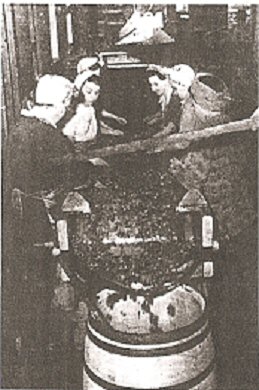
Ben Banman manager of the Chilliwack branch of the Pacific co-op informed The Progress yesterday's total of 72 tons was slightly less than the amount handled last Monday. This was due, however, he explained to the rush after the holiday week-end following Dominion Day festivities here.
"I think this Monday was really the peak. Our staff worked all night to handle the berries and I had to keep half of the workers here on Tuesday to handle the overflow," said Mr. Banman.
Approximately 120 tons were handled at the Yarrow plant Monday night and Tuesday morning, it is reported.
The total amount of raspberries handled at the Chilliwack branch Pacific co-op last year has been surpassed, Mr. Banman revealed. Over 800 tons have been received at the local co-op compared to last year's total of 640 tons.
C.H. Penner, manager at Yarrow Co-op informed The Progress that an average of 110 tons of raspberries was handled every night last week. Over 1200 tons have been received at Yarrow up to this week.
First blackberries were received at the local Pacific co-op last week. No blackberries have been delivered to the Yarrow plant yet.
|
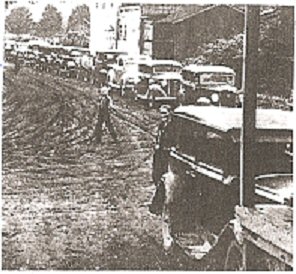
Sixteen women worked steadily all night at the Pacific Co-op plant Monday sorting out part of the largest raspberry crop the district has ever seen. The workers sort out poor berries as the conveyor belt carries the fruit towards a barrel, seen in the foreground. Each belt fills about ten barrels an hour, or about two tons of berries. At the Yarrow Growers' co-op, the process is much the same.
All U.K. contract commitments have been fulfilled by co-ops in the Chilliwack and Yarrow districts. The local branch of the Pacific co-op reported all of the 2500 barrels of SO2 rasps for the U.K. had been shipped before Monday and Yarrow Growers' co-op officials said the last 600 barrels of their 5250 barrels was sent to New Westminster by truck yesterday.
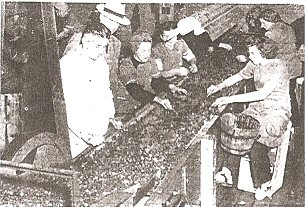
George Reimer (in overalls above) foreman at the big Yarrow plant, supervises sorting of the raspberries on one of the six conveyors in the building. J.C. Krause, president of the Fraser Valley Fruit Growers' Federation is shown checking the flow of berries. The barrels containing about 400 pounds of raspberries are filled with SO2 solution and sealed. The Yarrow plant's big storeoom will hold over 2000 barrels.
Harvest of the $165,000 strawberry crop in the Yarrow and Chilliwack areas has been completed berry authorities say. Mr. Banman and Mr. Penner both report that the strawberries brought in on Tuesday of last week were "probably the last that will be handled" at the two plants.
Mr. Banman explained that although this years' strawberry harvest may not be a record in terms of yield, it is a record as far as returns to the growers are concerned. Prices paid this year for strawberries he explained are higher on average than at any time in the past.
|
|
(Below) Trucks stand by outside to haul away part of the Yarrow co-op shipment of 5250 barrels of SO2 raspberries destined for fruit hungry Britain. The last 600 barrels needed to complete the Yarrow portion of the UK shipment were sent yesterday. The berries are taken to New Westminster where they are stored pending availability of a ship.
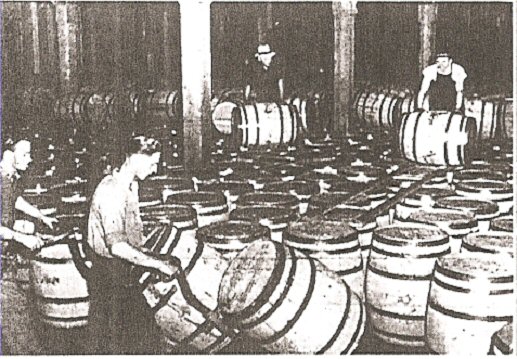
F. Dick, manager at the Sumas Growers' co-op, said that over 38 tons of strawberries have been received this year compared with last year's total of 10 tons. Of last year's amount, 17½ tons were shipped fresh to Fraser Valley Frosted Foods and 20 tons were packaged in SO2 for delivery to local and eastern Canada jam factories.
All of the 1000 barrels of SO2 raspberries that the Sumas Plant had contracted to ship to the U.K. have been delivered to New Westminster, Mr. Dick said.
Ninety-three tons of strawberries were received at the Arnold Growers' co-op compared to last year's total of 32 tons an official revealed. One hundred and seventy-six tons of raspberries have been handled at the plant thus far, 50 tons of which is earmarked for the U.K. The 38 barrels remaining to complete the Arnold portion of the U.K. contracts should be shipped this week. Total raspberry tonnage at Arnold last year was 217 tons.
|
|
Pacific Coast Packers Ltd.
Yarrow Branch |
|---|
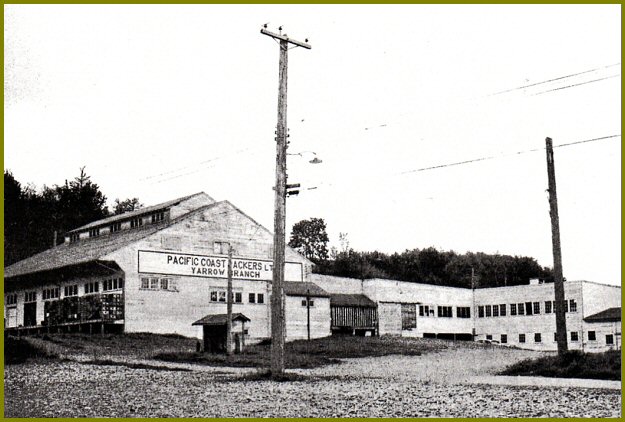 |
| Yarrow Growers' Co-operative Until 1950 |
|---|
|
The Chilliwack Progress - Weekend/Milestones - July 27, 2003
|
|---|
|
Yarrow's Vital Business (History)
by
Kelly Harms, Community Archivist,
Chilliwack Museum and Archives
Small fruit production and packaging play an enormous role in the early economic development and history of Yarrow. The raspberry industry, in particular, grew to a point where Yarrow became one of the largest raspberry-producing areas in Canada.
After years of competition among individual growers, the decision was made in 1937-38 to form the Yarrow Grower's Cooperative. An article by Ernie Harder appeared in the August 26, 1959 edition of The Chilliwack Progress. Harder quotes early founding member Jacob Kraus as saying: "We had no capital but we had plenty of support and gradually an organization was built up
Krause went on to become the first manager of the co-op, a position he held for 10 years.
The berry packing industry continued to grow, reaching a peak in 1946, when "berries became rationed, business flourished, population of Yarrow swelled and growers enjoyed 15 cents per pound returns."
"In 1947, Yarrow alone produced close to 6,000 tons of berries. Five tons per acre was the average yield in raspberries and eight tons was not unusual." The decline in the market
however culminated in the crash
of 1948.
Prior to the slump "the co-op built a $52,000 processing plant and cannery with $30,000 worth of equipment." Shortly after the slump "two-thirds of the total raspberry acreage had been pulled out and the majority of co-op members wanted to withdraw." Members were given "29 cents per dollar on their shared and those who wanted to stay in took ownership of the warehouse. The retail store was sold and the co-op which had paid up all its assets was dissolved."
Following the collapse of the co-op, "the warehouse was rented to Cheam Packing Company then sold to Pacific Coast Packers for a sum just under $50,000. All the equipment and machinery was sold with the warehouse."
|
Cascade Foods Ltd.
Yarrow Branch, Eckert Road |
|---|
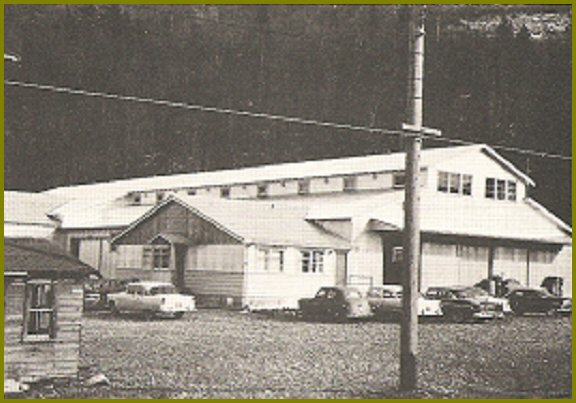 |
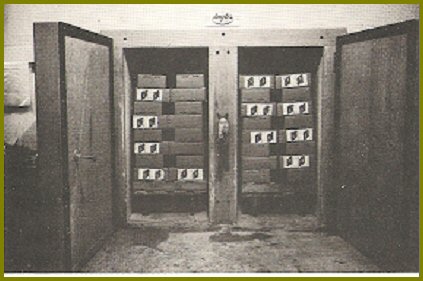 |
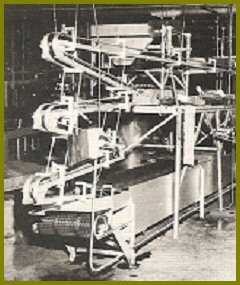 |
| 'Quick Freeze' Freezer | Belt For Sorting Berries |
|---|
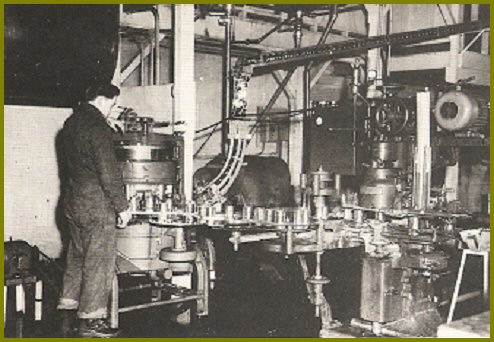 |
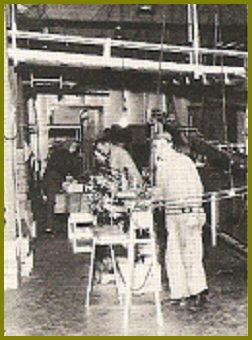 |
| Filling Cans | Working the Belt |
|---|
— — — The Chilliwack Progress July, 1955 — — —
|
|---|
|
Packer Chief Inspects Yarrow Plant
|
|
Here On Visit From U.S.
A prominent American lawyer and businessman, Marcus L. Urann, President of Cascade Foods., left yesterday for his home near Boston, Mass., after spending the latter part of July inspecting the Cascade processing plant in Yarrow.
"Our plant has a great potential to be of service to this community," Mr. Urann, an amiable, businesslike man, stated. "We hope to find a better and a larger market for products grown here," he said, "and we are doing research work to find new ways of using these products."
Vacuum System Planned
At present, field and plant research work is being carried on at Yarrow and a vacuum system of canning, which will preserve fruits such as strawberries and raspberries whole, is being installed.
The plant at Yarrow, which was completed last June by Ocean Spray of Canada Ltd., was purchased in January by Mr. Urann and several other financiers who formed Cascade Foods Ltd.
Hector Carslake is vice-president and general manager; J.H. Cathro, treasurer and comptroller; Miss Tina Ratzlaff, assistant treasurer; William Evans, Vancouver, F. Nelson Blount, Rhode Island, William C. Bennett, Vancouver, and Benjamin Koblosky, Hanson, Mass., directors. During the peak of the growing season over 100 are employed at the plant.
|
Canning His Trade
Mr. Urann, a lawyer by profession, has made cranberry growing and canning his trade. He first invested in cranberries in 1907, and in 1912 he originated the canning of cranberries.
Last Year he retired as president of the National Cranberry association, a co-operative which has eight plants. Five million cases of cranberry sauce valued at $20,000,000 were sold last year. Only one-half of the crop is canned, the other half is sold fresh.
Grower-members of the company now total 167.
Mr. Urann, also a cranberry grower, has 700 acres of berries on Cape Cod. He will ship part of his harvest to B.C. to be processed this winter at Yarrow.
Over $200,000 is invested in the Cascade Packing plant at Yarrow. The 70x80 yard aluminum covered building, which is situated on Eckert Road near the foot of Vedder mountain, houses equipment able to can or freeze two tons of fruit or vegetables an hour.
Mr. Urann, who also has an interest in the clam and oyster industry on the east coast, sincerely hopes his business can be of greater service to the community, because, he stated, : No business can be big unless it is of service to the community."
Enthusiastic over "the beautiful county"and "the universal friendliness of the people here," Mr Urann took a holiday cruise to Alaska before flying home. He plans to make a return trip to the Yarrow plant in October.
|
|
— — — The Chilliwack Progress Wednesday, February 25, 1959 — — —
|
|---|
|
Disastrous Fire Hits Yarrow Plant
by Wally Strang, News Editor
|
|
Over $250,000 Loss
The second major fire in as many days struck Saturday at Yarrow when the Cascade Food plant was destroyed in one of the most spectacular blazes in the history of the Fraser Valley.
Loss in the blaze is expected to exceed a quarter of a million dollars.
Marcus M. Urann, one of the principal shareholders from Massachusetts, will be called to determine when and if reconstruction will start.
In the meantime the company will continue in business. Operations were being carried out as usual Monday morning at the Pacific Coast Packers warehouse across the street. The 20 employees are still on the payroll.
The first major fire to strike the district was less than ten miles away where the Cultus Lake school burned to the ground late Thursday night.
For more than three and a half hours Saturday, volunteer firemen from Yarrow, Chilliwack municipality and Chilliwack city fought a desperate battle against overwhelming odds as the wind fanned blaze ripped through the modern plant.
It was 10:00 a.m. when the fire alarm was sounded by 13-year old Irma Bunse, 1052 Eckert Road, who acted upon the instructions of her mother, while 73-year old Theale Bunse risked his life in a vain attempt to check the wind-swept flames.
The fire was first noticed by Mr. Bunse who was leading his cow out to the pasture at 9:30 a.m. He called to his wife to sound the alarm and headed for the southeast corner of the food processing plant, where a pile of berry flats was burning against the outside wall.
The 73-year-old retired man, who worked in the plant two years ago, smashed a window around the side of the building and attempted to find a hose which he thought was not too far from the fire, however he found the hose had apparently been moved since his retirement.
By the time he got outside again the flames were lashing up the side of the building.
In the meantime telephone calls to the Yarrow fire department were delayed as Irma was unable to get an answer. She said no one answered the first calls and finally a child answered and by the time the child conveyed the message to the proper authorities more than twenty minutes had elapsed from the time the fire was first noticed. She said, "once I got hold of someone on the other end, it was only a matter of a couple of minutes before the fire department was pumping water into the fire."
The fire is believed to have started inside the building,
|
and ashes fell on flats outside the northeast corner.
Rumours that the blaze may have started outside in wooden berry flats have been discounted by a spokesman for the firm.
The plant was officially opened May 18, 1954, four and a half months after construction was started January 19 of the same year.
All records and office supplies were saved when Miss Tina Ratzlaff and volunteers loaded everything into a nearby truck. Tina said they had to work fast because flames were swirling through the half a black long structure at the speed of an express train.
The two principals of the firm, Hector C. Carslake, manager, and Jack Cathro, treasurer, were in Vancouver at the time the fire broke out.
The gale force wind didn't give firemen a chance as they battled insurmountable odds.
Firemen first attempted to save nearby sheds and found it hopeless as the flames shot hundreds of feet in the air. The smoke could be seen from Chilliwack, nearly 15 miles away.
A small barn belonging to the Bunse family went up in flames an hour after the fire started even though it was more than 75 yards away from the factory.
An hour and a half later the roof was completely enveloped in flames and by noon all that remained standing was some of the outside walls.
Firemen in the meantime worked at break-neck speed to save another large plant belonging to Pacific Coast Packers Ltd. across the road. If it had not been for the almost inexhaustible water supply the building would have certainly been destroyed.
The roof of the Pacific Coast Packers' building caught fire many times as firemen were completely obliterated by heavy smoke and flying debris.
In the meantime volunteers helped the Bunse family remove all their belongings from their home, which only suffered smoke damage, while others helped firemen pull hoses.
To add to the general confusion which prevailed for the first two hours, explosions sounding like mortar shells filled the air with cans flying in all directions.
There were no serious casualties, although district Chief Bob Butchart would have lost his hair if it were not for the quick action of another fireman in extinguishing the burning bristles. Other firemen suffered superficial burns.
Residents in the area brought coffee and sandwiches to the firemen and others threw open their doors to anyone wishing to use telephones, washrooms or requiring emergency first aid equipment.
|
|
Victor Froese writes: We lived at the corner of Eckert Road and Ratzlaff Road, across from Cascade's plant. I actually spotted the smoke at the rear of the cannery from our house.
It was Saturday and no one was working.
In those days (1959) the Firehall was where the waterworks building stands today. I could not get through by phone, so drove down and turned in the alarm.
Later I was asked to testify in an insurance/court hearing.
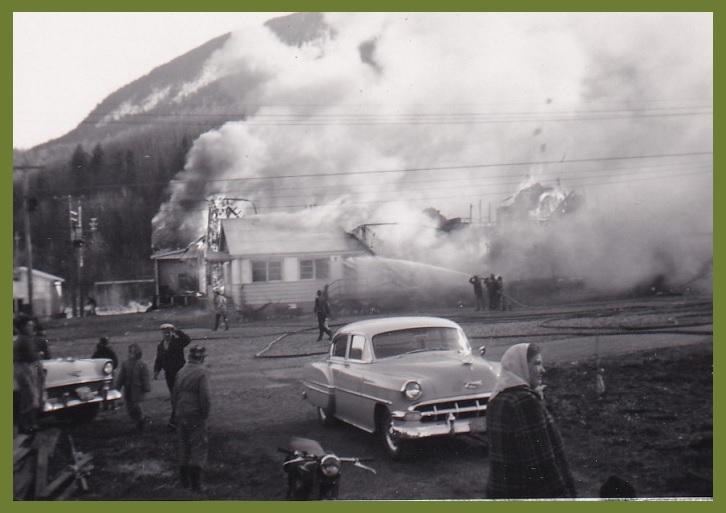
Cascade's Fire Photography Courtesy of Victor Froese
More Cascade's Fire Photographs from the Chilliwack Progress
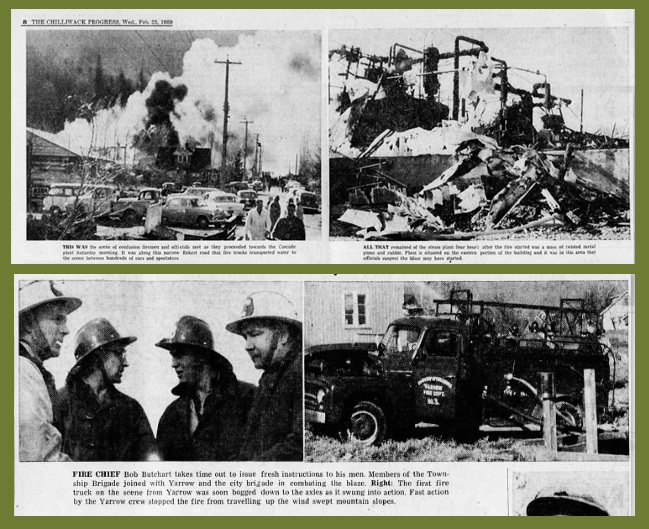
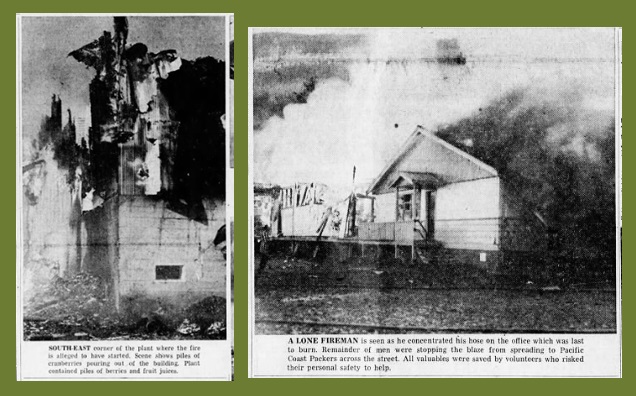
|
|
|
Chilliwack Progress - Aug 29, 1959
Community Portrait - Jacob C. Krause
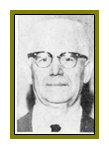
Jacob Krause is a pioneer, but his easy-going, optimistic manner conceals it. When he came to Yarrow 31 years ago as part of C.E. Eckert's plan to colonize that part of the valley
he didn't really know what type of development for which the area was most suited.
But he had "high hopes" - that's why he originally came here from the prairies.
He was one of the organizers and boosters of the Yarrow Grower's Co-op and he sees a bright future for the community.
The Krauses settled in Yarrow with four children, (there were to be four more Krause children) and eleven other families.
"We got off to a rough start in Canada when we first arrived from Russia in 1924," admits Mr. Krause. "Farming in Saskatchewan was horrible and we saw there was not future in staying there."
The family saved just enough money to make the trip to B.C. possible.
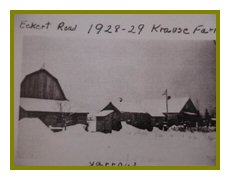 "We all worked in the Sumas hopyards at the same time trying to develop our farms at home." The families cultivated sugar beets, spinach, peas, beans and finally berries. The fertile soil proved
to be best for small fruits, especially raspberries.
"We all worked in the Sumas hopyards at the same time trying to develop our farms at home." The families cultivated sugar beets, spinach, peas, beans and finally berries. The fertile soil proved
to be best for small fruits, especially raspberries.
Chief problem was marketing the fruit. "Instead of the all the neighbours competing against each other, we decided organization of a co-op would be the ideal set-up." So the Co-op was formed
and Mr. Krause was named manager.
The Co-op's first investment was an old fire wagon bought from the Chilliwack city and Mr. Krause states, "I began peddling the berries all over the valley, in Vancouver and points just
south of the border."
By 1946 berries were being grown extensively in East Chilliwack, Greendale, Arnold, Abbotsford and Langley. With the exception of Langley, these areas marketed their fruit co-operatively,
Mr. Krause heading the sales agency.
He left the managerial position with the Yarrow Co-op to take up the new post.
Though the Yarrow Co-op failed to survive the slump of 1948-49, Mr. Krause still firmly believes that the cooperative method of marketing is still the best.
"It saved people in Yarrow thousands of dollars and if the growers hadn't panicked in that one year, the co-op would be in business today."
There are no more berries in the Krause's lives. In 1948 Mr. Krause cultivated six acres, but five years ago, he sold the farm and today, instead of berries, the Krauses have
flowers surrounding the modern bungalow on Eckert Road.
Now an accountant and, still optimistic, he sees a brighter future for the berry industry. He believes that by planting the right variety and raising top quality fruit, there is no
reason why conditions shouldn't improve.
Mr. Krause was born in Russia in 1894 to a farming family and when he was only seven, his father died, so his mother moved into the village with the four children to have them educated.
"But that wasn't the only education for us," recalls Mr. Krause. "When we came to Canada and Saskatchewan, we went to school to learn English and to learn about how the cow jumped over the moon."
All eight of the Krause's children are married and scattered over all parts of the globe.
One daughter, Betty is in Calcutta, India with her family, doing relief work with the Mennonite Church. Another daughter, Joan teaches in Fresno, California. The eldest daughter Melita is married to
Frank Peters, PhD, professor at the MB College in Winnipeg. One son Carl, farms in Yarrow.
Local drygoods store operator, Corney Giesbrecht is a son-in-law to the Krauses.
He also farms about 14 acres of berries.
Mr. Jacob Krause, who has enjoyed good health all his life, is happy with his job as accountant for the Public works department of the township of Chilliwack.
He and his wife Mary are enjoying life in the community they played an important part in settling and developing.
|
— — — The Chilliwack Progress Wednesday, March 31, 1965 — — —
Yarrow Plant Up In Flames, Heavy Loss
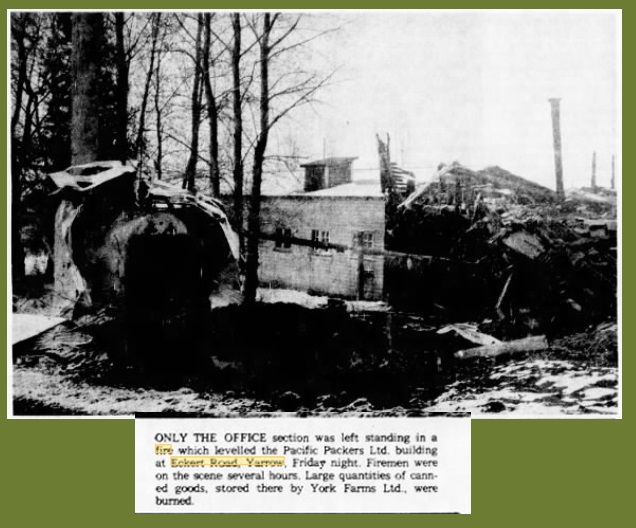
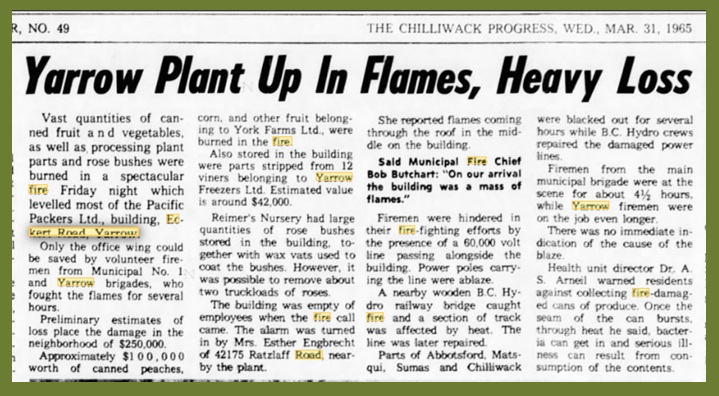
Pacific Coast Plant Fire Photograph Below Courtesy of Victor Froese
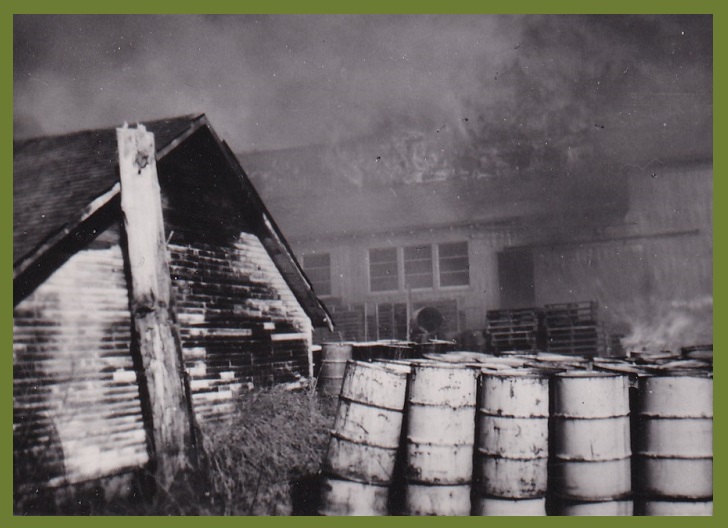
|
The Raspberry Patch
by Esther Epp Harder
|
|
Picking Raspberries
A Reminiscence by Ken Hiebert
Recently I was chatting with a woman I sing with. I don't know how it came up, but I discovered that she had been in Yarrow in 1951 or 1952.
She grew up in a small Prairie town and when she turned 16 she wanted to go to BC for the summer. Her mother agreed, if she could find a job. A diligent search led to berry picking in Yarrow. So she and a friend hitchhiked to their job.
People in Yarrow were not ready for two teenage girls walking down the street wearing shorts. One store owner ordered them out of his store. After that they ventured downtown only when necessary. Even in the fields they found that the Yarrow girls were covered from the neck down.
As girls from out of town and away from their parents, they attracted the attention of the local boys. (That was true when I lived in Yarrow ten year later. I remember one guy who appropriated a Raspberry Pickers Wanted sign for his car window).
So I guess it was not a surprise that the farmer's wife would sit in the window in the evenings to watch for boys who might be prowling around.
|
|
|
















 "We all worked in the Sumas hopyards at the same time trying to develop our farms at home." The families cultivated sugar beets, spinach, peas, beans and finally berries. The fertile soil proved
to be best for small fruits, especially raspberries.
"We all worked in the Sumas hopyards at the same time trying to develop our farms at home." The families cultivated sugar beets, spinach, peas, beans and finally berries. The fertile soil proved
to be best for small fruits, especially raspberries. 


